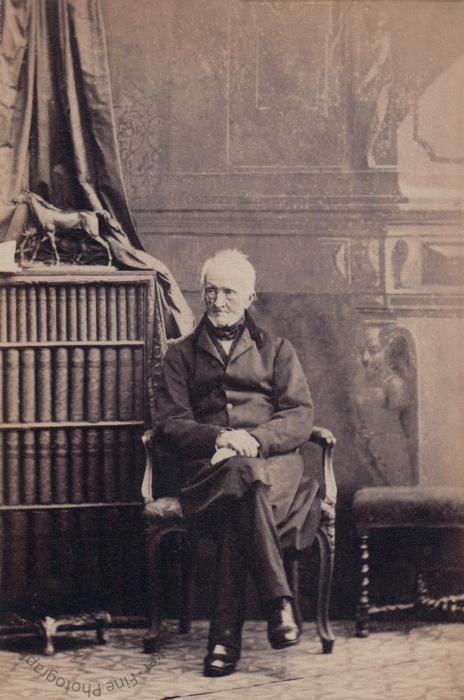Dr Clement Carlyon
(1777-1864)
9 June 1863
Volume 10, page 275, sitting number 13,468.
Clement Carlyon was the fourth son of the Reverend John Carlyon (1722-1798), Rector of Broadwell in Essex. Born at Truro on 14 April 1777, he was educated at Truro grammar school and at Pembroke College, Cambridge (BA 1798, MA 1801, ML, 1804, MD 1813). He practised as a physician in Truro from 1806 to 1861, and was five times elected the Mayor of Truro.
He was the author of Latin letters to the Vice-Chancellor of Cambridge (1799-1800); An authentic narrative of the extraordinary fortitude and miraculous preservation of Thomas Holman (1816); Observations on the endemic typhus fever of Cornwall (1827); Early years and late reflections (2 volumes 1836-1843, 2nd edition, 4 volumes 1856-1858); and Precepts for the preservation of health, life, and happiness, medical and moral (1859). This last named carries a portrait of Dr Carlyon opposite the frontispiece.
On 22 April 1806 married his first cousin, Eliza Carlyon, second daughter of Thomas Carlyon of Tregrehan. Their marriage produced three sons and five daughters.
Dr Clement Carlyon died, aged 86, at his residence in Truro on 5 March 1864, leaving effects valued at £2000.
According to his long obituary in the Royal Cornwall Gazette (11 March 1864): 'his life had been marked by unremitting but unostentatious benevolence; by unwearying labor in the cause of literature and science, and for the good of his fellow creatures. His public career was marked by steady and unswerving principles, and uncompromising integrity, whilst in private his gentleness and swavity [sic] of manner, combined with fervent and unassuming piety, won him the good will and friendship of all with whom he came in contact. The news of his death will therefore cast a gloom over many a hearth, not only in Truro and its neighbourhood, but throughout the whole county, and indeed, we may add, to a great extent, throughout the country, for his reputation was not merely local, it was widespread. [...] Whilst we must all deeply regret the loss of a useful citizen, a profound scholar, a staunch Churchman, an exemplary Christian, and an upright man, we have reason to contemplate with thankfulness a long and profitable life, concluded by a calm and happy death in the midst of a loving family and a host of devotedly attached friends.'

